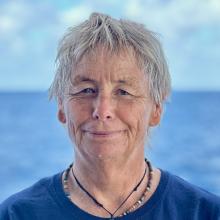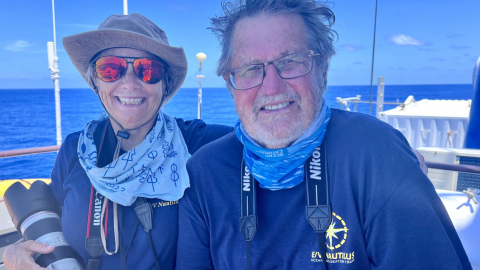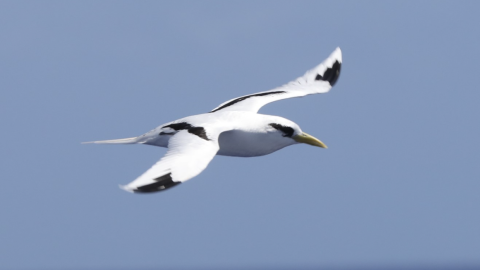
Karen Baird
Tell us about your work/ research. What kinds of things do you do?
I provide advice and support to Pacific Island governments on conservation and management of threatened and migratory species. This includes whales and dolphins, sharks and rays, marine turtles, dugong and seabirds. We have a regional strategic plan (Pacific Island Regional Marine Species Programme 2022-2026) which provides guidance through Action Plans for each species group. We support research into issues such as fisheries by-catch and assist with training on mitigation methods; extinction risk assessments for turtles; reviewing threats to cetaceans across the Pacific. We support training and workshops on a range of issues relating to marine species and help countries develop action plans for managing species such as sharks and rays. Many of these species are listed on multilateral environmental agreements such as the Convention on Migratory Species and the Convention on International Trade in Endangered Species to which some Pacific countries are signatories, so we support with technical advice on meeting their obligations under these conventions.
What sparked your initial interest in your career?
I have always been interested in the natural world from a teenager doing hiking and diving. I always wanted to work for the NZ Wildlife Service, now the Department of Conservation so headed off to university to study Zoology. I was lucky enough to land short term jobs during university and later was employed full time doing wildlife surveys and later as a marine conservation officer. While managing a remote group of subtropical islands restoration programme. the Kermadec Islands I became even more interested in seabirds and supported research on their recovery after predators were eradicated. I have a particular interest in storm petrels and have been involved in research on the NZ storm petrel which was once considered extinct as well as storm petrels in the Galapagos Islands and in Chile. I hope one day to rediscover the long-lost Samoan storm petrel.
Who influenced you or encouraged you the most?
My dad was a passionate bird person too and of course fueled my own desire to work with wildlife. He was a photographer and sound recordist.
What element of your work/ study do you think is the most fascinating?
There's lots to love about my work, currently at SPREP which is based in Samoa, I am enjoying supporting Samoa's government staff and the local conservation organisation to discover the world of seabirds particularly the more cryptic, nocturnal procellariid (petrels and shearwaters) which we now know are breeding somewhere in the remote forested mountains and valleys of Samoa.
How did you get involved with Ocean Exploration Trust? How did you become part of the expedition team?
I watched a webinar hosted by NOAA about the Ocean Exploration Trust's work. I became excited about the possibility of joining an expedition to look for seabirds, so I contacted Daniel Wagner the OET Chief Scientist.
What other jobs led you to your current career?
Most of my career has been in conservation management. I did have a break when I started a wildlife tour company and ran birdwatching tours for 10 years... but my interest and passion in conservation management led me back to a job with the Department of Conservation managing the Kermadec Island restoration programme. Following that I joined a NZ NGO Forest and Bird and BirdLife International as their Pacific Marine Adviser working on seabird bycatch which is a major cause of decline of the world's seabirds especially albatrosses.
What are your degrees and certifications?
I have a BSc and MSc in Zoology from Auckland University. I am up to date on my outdoor first aid training and fire drills.
What are your hobbies?
I love hiking and exploring new areas, snorkeling, gardening, sea kayaking
What advice would you give someone who wants to have a career like yours?
Start with the basics in terms of studying at university but get involved in volunteer work in conservation in the field where you can learn skills you probably won't learn at uni. Conservation volunteers are usually field experts with years of experience. Join scientific societies as well for the same reason.
What excites me most is the potential for new disccoveries discoveries its like treasure hunting!
Expeditions
Karen participated in the following Ocean Exploration Trust expeditions:


